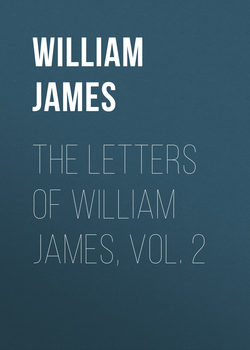Читать книгу The Letters of William James, Vol. 2 - William James - Страница 9
XI
To his Daughter
ОглавлениеEl Paso, Colo., Aug. 8, 1895.
Sweetest of Living Pegs,—Your letter made glad my heart the day before yesterday, and I marveled to see what an improvement had come over your handwriting in the short space of six weeks. "Orphly" and "ofly" are good ways to spell "awfully," too. I went up a high mountain yesterday and saw all the kingdoms of the world spread out before me, on the illimitable prairie which looked like a map. The sky glowed and made the earth look like a stained-glass window. The mountains are bright red. All the flowers and plants are different from those at home. There is an immense mastiff in my house here. I think that even you would like him, he is so tender and gentle and mild, although fully as big as a calf. His ears and face are black, his eyes are yellow, his paws are magnificent, his tail keeps wagging all the time, and he makes on me the impression of an angel hid in a cloud. He longs to do good.
I must now go and hear two other men lecture. Many kisses, also to Tweedy, from your ever loving,
Dad.
On December 17, 1895, President Cleveland's Venezuela message startled the world and created a situation with which the next three letters are concerned. The boundary dispute between Venezuela and British Guiana had been dragging along for years. The public had no reason to suppose that it was becoming acute, or that the United States was particularly interested in it, and had, in fact, not been giving the matter so much as a thought. All at once the President sent a message to Congress in which he announced that it was incumbent upon the United States to "take measures to determine … the true" boundary line, and then to "resist by every means in its power as a willful aggression upon its rights and interests" any appropriation by Great Britain of territory not thus determined to be hers. In addition he sent to Congress, and thus published, the diplomatic despatches which had already passed between Mr. Olney and Lord Salisbury. In these Mr. Olney had informed the representative of the Empire which was sovereign in British Guiana "that distance and three thousand miles of intervening ocean make any permanent political union between a European and an American state unnatural and inexpedient," and that "today the United States is practically sovereign on this continent, and its fiat is law upon the subjects to which it confines its interposition." Lord Salisbury had squarely declined to concede that the United States could, of its own initiative, assume to settle the boundary dispute. It was difficult to see how either Great Britain or the United States could with dignity alter the position which its minister had assumed.
James was a warm admirer of the President, but this seemingly wanton provocation of a friendly nation horrified him. He considered that no blunder in statesmanship could be more dangerous than a premature appeal to a people's fighting pride, and that no perils inherent in the Venezuela boundary dispute were as grave as was the danger that popular explosions on one or both sides of the Atlantic would make it impossible for the two governments to proceed moderately. He was appalled at the outburst of Anglophobia and war-talk which followed the message. The war-cloud hung in the heavens for several weeks. Then, suddenly, a breeze from a strange quarter relieved the atmosphere. The Jameson raid occurred in Africa, and the Kaiser sent his famous message to President Kruger.4 The English press turned its fire upon the Kaiser. The world's attention was diverted from Venezuela, and the boundary dispute was quietly and amicably disposed of.
4
In a brief letter to the Harvard Crimson (Jan. 9, 1896), James urged the right and duty of individuals to stand up for their opinions publicly during such crises, even though in opposition to the administration. Mr. Rhodes, in his History of the United States, 1877-1896, makes the following observation: "Cleveland, in his chapter on the 'Venezuelan Boundary Controversy,' rates the un-Americans who lauded 'the extreme forbearance and kindness of England.' … The reference … need trouble no one who allows himself to be guided by two of Cleveland's trusted servants and friends. Thomas F. Bayard, Secretary of State during the first administration, and actual ambassador to Great Britain, wrote in a private letter on May 25, 1895, 'There is no question now open between the United States and Great Britain that needs any but frank, amicable and just treatment.' Edward J. Phelps, his first minister to England, in a public address on March 30, 1896, condemned emphatically the President's Venezuela policy." See Rhodes, History, vol. VIII, p. 454; also p. 443 et seq.
